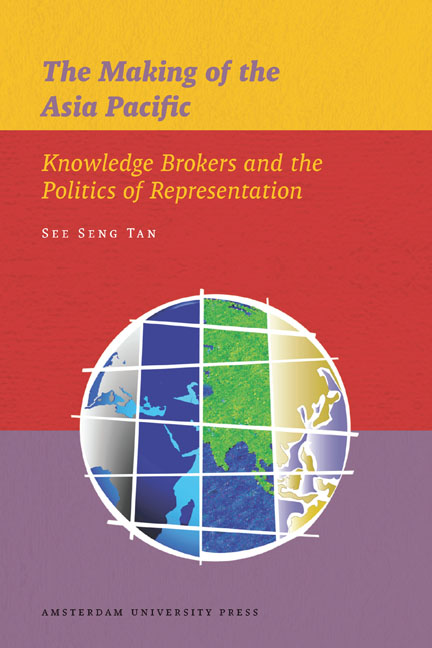Book contents
- Frontmatter
- Dedication
- Contents
- List of Tables
- Acknowledgements
- 1 Introduction: From ‘Pacific Asia’ to ‘Asia Pacific’
- 2 The Desire for Essence
- 3 Knowledge Networks as Agents of Representation
- 4 Representing the ‘Asia Pacific’
- 5 Representing Sovereign States
- 6 Representing the ‘In/Human’ Faces of Asia Pacific Security
- 7 Representing the ‘Authority’ of Knowledge Networks
- 8 Conclusion: A Plea in Three Parts
- Notes
- Bibliography
- Index
- Miscellaneous Ensmatter
8 - Conclusion: A Plea in Three Parts
Published online by Cambridge University Press: 10 December 2020
- Frontmatter
- Dedication
- Contents
- List of Tables
- Acknowledgements
- 1 Introduction: From ‘Pacific Asia’ to ‘Asia Pacific’
- 2 The Desire for Essence
- 3 Knowledge Networks as Agents of Representation
- 4 Representing the ‘Asia Pacific’
- 5 Representing Sovereign States
- 6 Representing the ‘In/Human’ Faces of Asia Pacific Security
- 7 Representing the ‘Authority’ of Knowledge Networks
- 8 Conclusion: A Plea in Three Parts
- Notes
- Bibliography
- Index
- Miscellaneous Ensmatter
Summary
There are no rules by which intellectuals can know what to say or do; nor for the true secular intellectual are there any gods to be worshipped and looked to for unwavering guidance. (Said 1994: xiv)
Shortly after the Cold War ended, Ken Booth, in appealing for a new language of international relations that would better fit with new realities, gravely announced, ‘Our work is our words, but our words do not work anymore’ (1991: 313). For knowledge networks that contribute to national and regional discourses with the ostensible aim to make the Asia Pacific region a more secure place and space, their words do not only constitute their work. Indeed, it may be said that their words – and the words of the scholarly community who study those communities – constitute and legitimise their existence, if only tenuously so, as subjects blessed with agential privilege to produce and purvey security knowledge. In short, their life is their words.
As with most books and their authors, mine has a personal dimension to it which provided much of its thrust. As Antonio Gramsci once mused, ‘the starting-point of critical elaboration is the consciousness of what one really is, and is “knowing thyself” as a product of the historical process to date, which has deposited in you an infinity of traces, without leaving an inventory’ (1971: 324). It is with a similar ‘self-consciousness’ that I, as an on-and-off ‘member’ of a knowledge network and participant to the Track 2 process in the region of interest here, embarked on this work of tracking the sorts of representational practices that constitute agency and sovereign subjectivity vis-à-vis the contemporary Asia Pacific and in which my fellow security intellectuals and I have been actively engaged. Needless to say, much work remains to be done in this area, although trackers of constitutive rituals and practices may be forgiven for feeling, not unlike Frost's bucolic traveller on a snowy evening, that they have ‘promises to keep’ and ‘miles to go before [they] sleep’ in navigating through woods ‘dark and deep’ (Frost 1979: 224).
But for now, I want to close with an appeal to fellow knowledge brokers regarding the need for greater critical awareness among ourselves about how we ‘do’ Asia Pacific security studies, as it were. To that end, three things come to mind, notably, essence, paradox and play.
- Type
- Chapter
- Information
- The Making of the Asia PacificKnowledge Brokers and the Politics of Representation, pp. 179 - 186Publisher: Amsterdam University PressPrint publication year: 2013



